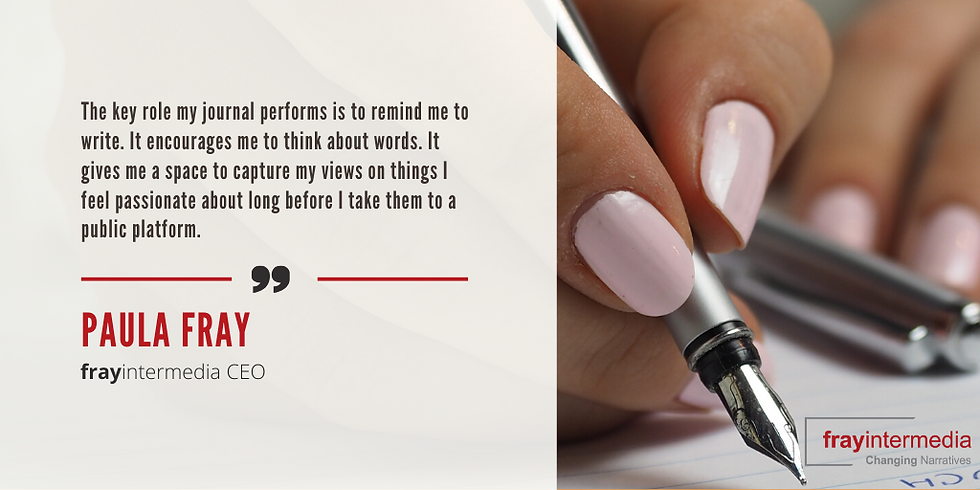OPINION: Keeping a journal in the time of COVID-19
- Paula Fray

- Apr 15, 2020
- 3 min read

When frayintermedia first hosted the Narrative Journalism Conference, a surprising thing emerged: Many of the accomplished narrative writers kept a journal.
It was oft-repeated advice: Keep a journal and keep it close so that you can capture thoughts as they happen.
We’ve come a long way from the times of the Moleskine so your journal can be anything - your phone, iPad or tablet, diary, notebook, or even a supermarket exercise book. It must just be accessible.
There are many creative, emotional and health benefits in writing a journal. When I went through a difficult period at the end of 2019, I started a gratitude journal. Even though it felt like pulling teeth on some mornings, the positive reframing at the start of each helped get through stressful times.
Journals are personal tools and, as such, you can use it in the way that benefits you most.
As a journalist, I use it to store story ideas. I record thoughts about issues. I jot down new words with their dictionary meanings. I capture phrases or examples of good writing.
I even doodle or map out story ideas - sometimes across several pages.
My journal is also a place to store articles or columns that I appreciate or photographs of events that I want to remember.
I keep electronic versions too: I use “Notes” on my phone and take lots of photographs to remind me of specific events I want to recall.
The key role my journal performs is to remind me to write. It encourages me to think about words. It gives me a space to capture my views on things I feel passionate about long before I take them to a public platform.
I throw all the words on the paper and then mine the journal for ideas, hooks, stories or even columns later on. It is only at that stage that I review the words and thoughts critically and allow myself to edit the work.
So, how to get started?
It takes consistency to build a new habit.
Start making the commitment to journaling and then set aside a specific time each day to spend at least 20 minutes recording your thoughts.
If necessary, set an alarm to remind you to write. But do write when the inspiration strikes you.
Have a specific place, if possible, and make sure that it is free of distractions such as access to the internet.
Capture everything - you can edit later.
Aim to write at least 200 words a day. At the very least, write down a thought, a phrase that caught your eye. You can put in news stories, paragraphs or even words that resonate. You can even doodle.
If you need to increase your vocabulary, identify a new word every day and write out its dictionary definition.
Don’t complicate the process: keep it simple. At first get into the habit of recording something on paper - lists, daily gratitudes, interest dialogue. You can start challenging yourself once you start getting into the habit of writing.
Consider the following questions for your first week:
Why am I starting a journal?
What do I want to achieve?
Who is happening in the world today?
What are my challenges in the weeks ahead?
You can also use frayintermedia’s #LockdownJournal video or photographic prompts.
So, what would you capture in the journal?
Your daily experiences;
Your views on events, people, places;
Your ideas for stories;
Your fiction story plots;
Brainstorming for columns;
Dialogue;
Epiphanies - whether these wake you up in the middle of the night or while you’re sitting watching television;
Descriptions of places and people;
The list is endless…
It is your journal … you can capture anything.
Writers write. If you want to use your voice effectively, it takes practice and perseverance.
Good luck.





Comments